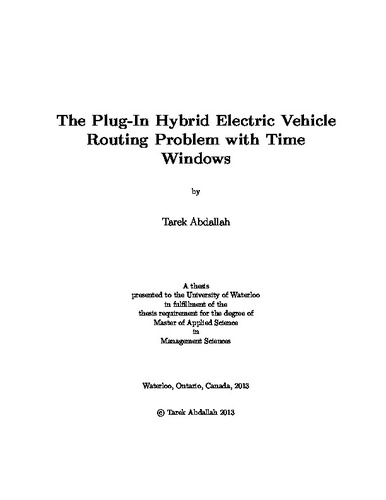The Plug-In Hybrid Electric Vehicle Routing Problem with Time Windows
| dc.contributor.author | Abdallah, Tarek | |
| dc.date.accessioned | 2013-05-24 15:52:49 (GMT) | |
| dc.date.available | 2013-05-24 15:52:49 (GMT) | |
| dc.date.issued | 2013-05-24T15:52:49Z | |
| dc.date.submitted | 2013-05-21 | |
| dc.identifier.uri | http://hdl.handle.net/10012/7582 | |
| dc.description.abstract | There is an increasing interest in sustainability and a growing debate about environmental policy measures aiming at the reduction of green house gas emissions across di erent economic sectors worldwide. The transportation sector is one major greenhouse gas emitter which is heavily regulated to reduce its dependance on oil. These regulations along with the growing customer awareness about global warming has led vehicle manufacturers to seek di erent technologies to improve vehicle e ciencies and reduce the green house gases emissions while at the same time meeting customer's expectation of mobility and exibility. Plug-in hybrid electric vehicles (PHEV) is one major promising solution for a smooth transition from oil dependent transportation sector to a clean electric based sector while not compromising the mobility and exibility of the drivers. In the medium term, plug-in hybrid electric vehicles (PHEV) can lead to signi cant reductions in transportation emissions. These vehicles are equipped with a larger battery than regular hybrid electric vehicles which can be recharged from the grid. For short trips, the PHEV can depend solely on the electric engine while for longer journeys the alternative fuel can assist the electric engine to achieve extended ranges. This is bene cial when the use pattern is mixed such that and short long distances needs to be covered. The plug-in hybrid electric vehicles are well-suited for logistics since they can avoid the possible disruption caused by charge depletion in case of all-electric vehicles with tight time schedules. The use of electricity and fuel gives rise to a new variant of the classical vehicle routing with time windows which we call the plug-in hybrid electric vehicle routing problem with time windows (PHEVRPTW). The objective of the PHEVRPTW is to minimize the routing costs of a eet of PHEVs by minimizing the time they run on gasoline while meeting the demand during the available time windows. As a result, the driver of the PHEV has two decisions to make at each node: (1) recharge the vehicle battery to achieve a longer range using electricity, or (2) continue to the next open time window with the option of using the alternative fuel. In this thesis, we present a mathematical formulation for the plug-in hybrid-electric vehicle routing problem with time windows. We solve this problem using a Lagrangian relaxation and we propose a new tabu search algorithm. We also present the rst results for the full adapted Solomon instances. | en |
| dc.language.iso | en | en |
| dc.publisher | University of Waterloo | en |
| dc.subject | hybrid electric vehicles | en |
| dc.subject | vehicle routing | en |
| dc.subject | lagrangian relaxation | en |
| dc.subject | tabu search | en |
| dc.title | The Plug-In Hybrid Electric Vehicle Routing Problem with Time Windows | en |
| dc.type | Master Thesis | en |
| dc.pending | false | en |
| dc.subject.program | Management Sciences | en |
| uws-etd.degree.department | Management Sciences | en |
| uws-etd.degree | Master of Science | en |
| uws.typeOfResource | Text | en |
| uws.peerReviewStatus | Unreviewed | en |
| uws.scholarLevel | Graduate | en |

